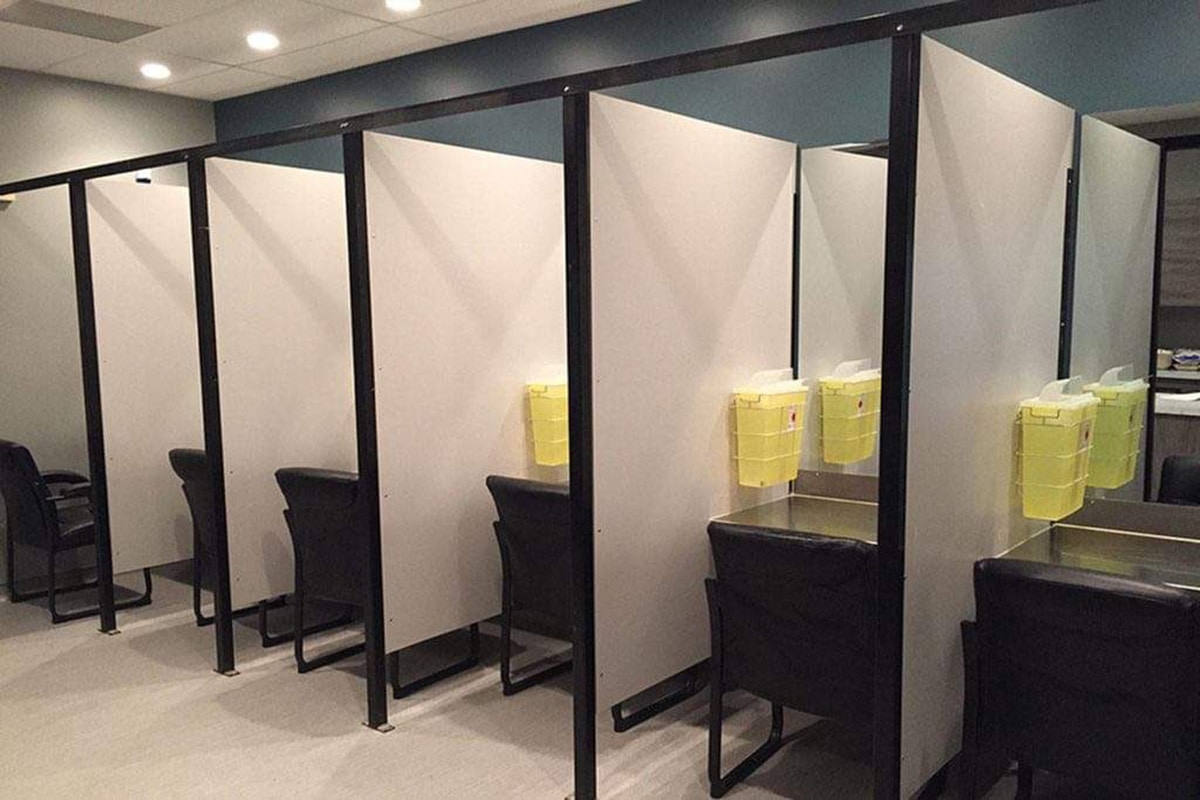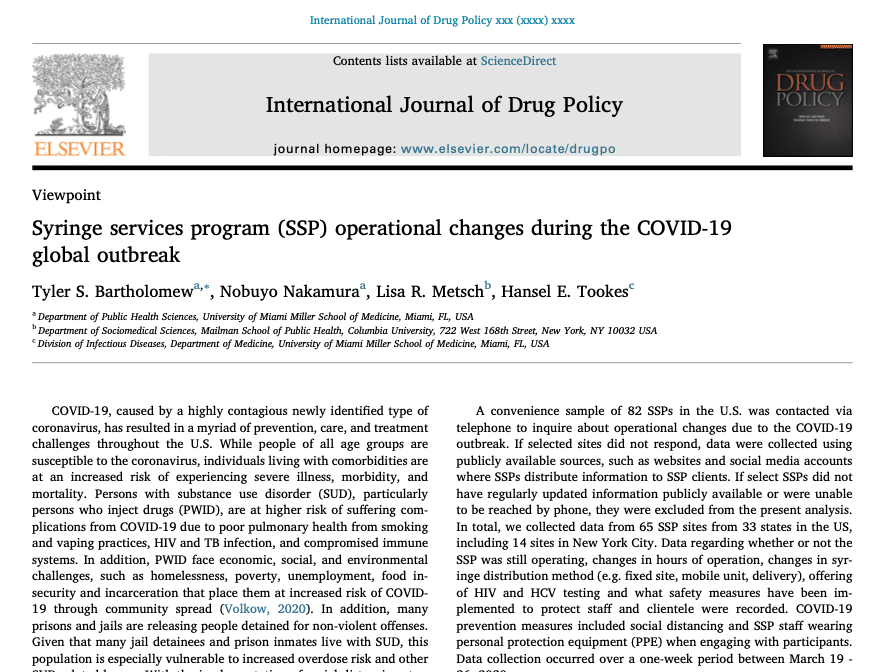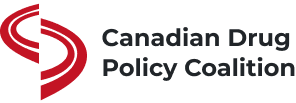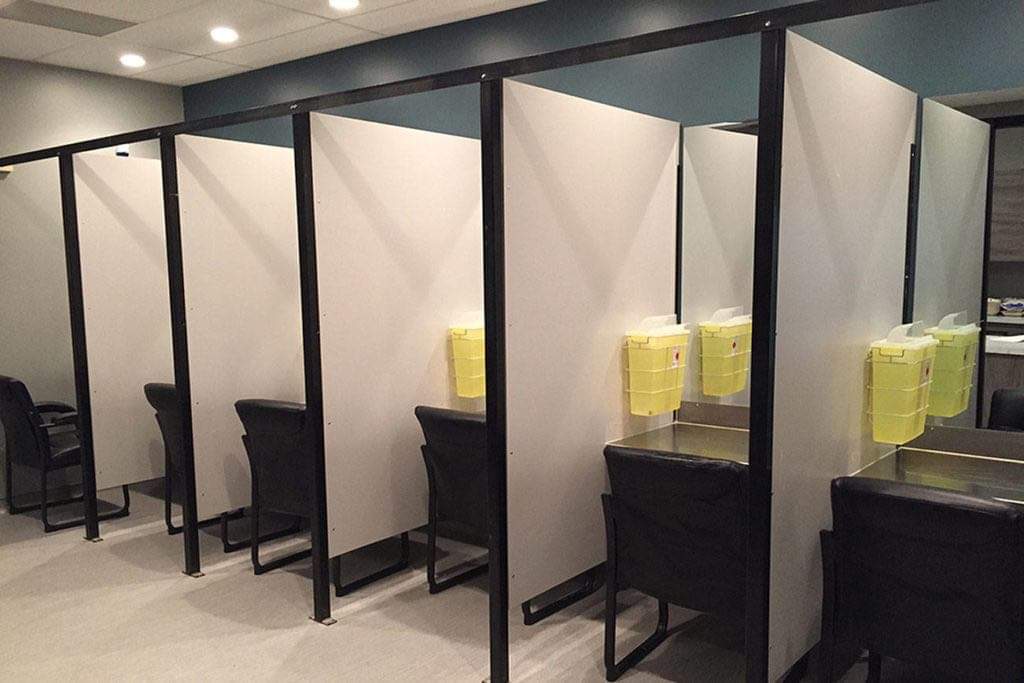ARCHES closes on international overdose awareness day, ARCHES closes on international overdose awareness day
International Overdose Awareness Day began in Australia in 2001 as a bold and public call to combat stigma around drug use, honour the lives that have been lost to overdose, and educate society on the life-saving value of harm reduction. It has grown every year, with a record 874 global events and participation from 39 countries, including Canada, in 2019. These are all encouraging signs that society is waking up to (and communities are mobilizing around) the truth that drug prohibition has failed and a new human rights- and public health-based approach to drug policy is desperately needed.
(Interactive)
But it’s hard to sense this shift from the actions of the Alberta government, which recently cut funding to Canada’s busiest supervised consumption site, ARCHES, which forced its closure. The doors close today, International Overdose Awareness Day—a time when we should be moving towards progress through compassionate, evidence-based drug policy by embracing more harm reduction, not less. Instead, Alberta, in darkly ironic fashion, is sliding backwards—a regress that erodes the public health and safety of one of Canada’s hardest hit provinces when it comes to overdoses.
Since opening in March of 2018, ARCHES, located in Lethbridge, Alberta, saw an average 663 visits per day. “That’s more daily visits than the busiest sites in Toronto—a city of more than two million, and Vancouver—where Canada’s first supervised consumption site was founded in 2003,” according to the Star Edmonton. The number of lives saved and positive impact to the greater community is immeasurable, so it is both baffling and dangerous to shut the doors on such a vital health service. Research from chief coroners across Canada makes it clear that using drugs alone is extremely risky at a time when the drug market is so toxic. People will likely die without the supervised consumption services ARCHES provides and the supportive environment it affords.
In the first quarter of 2020, there were 127 fatal overdoses related to fentanyl in Alberta, an increase from the previous quarter where there were 105. 85% of the deaths this year occurred in larger urban centres like Edmonton, Calgary, Red Deer, and yes, Lethbridge1.
In such a climate of death and human suffering, governments should be expanding harm reduction, not scaling it back. Alberta’s provincial government decided to pull funding after a financial audit found suspected financial irregularities around spending and expenses. But this is no reason to punish the marginalized clients who use the facility daily—whose very lives depend on its services and the community of care that has formed around them.
TAKE ACTION: Sign the open letter to restore funding to ARCHES
The Government of Alberta announced a mobile site will replace the services lost with the closure of ARCHES. But advocates warn that this can in no way replace the scale of services and community building a site like ARCHES provided. They’ve done the math, and the numbers are a cause for deep concern.
Let’s do some math! @archesleth SCS sees 800 people a day.
— Overdose War Room (@ODWarRoom) August 19, 2020
They have 13 booths for injecting, snorting or consuming drugs from the unregulated market.
The 2 inhalation spaces (6-8 people total) have been closed because of #Covid19AB so lets put that aside for the moment. 1/4 pic.twitter.com/yufJ4eoNkW
Across Canada fatal overdoses are climbing, fuelled by the stress and public health strictures of COVID-19. In July, deaths hit a grim milestone in Toronto, claiming more lives than the coronavirus. Saskatchewan recorded more fatal overdoses in the first eight months of this year than all of 2018, “meaning the province may have set a new record for the number of people who have lost their lives to overdoses. The Saskatchewan Coroners Service says there were 40 confirmed and 139 suspected drug toxicity deaths between Jan. 1 and Aug. 6, for a total of 179,” writes Zak Vescera of the Chronicle Herald.

And in British Columbia, two consecutive months of record-breaking overdose deaths have both shattered and enraged the spirits of affected communities. This May there were 171 fatal overdoses; in June, 177; and in July, 175. Across Canada, grief, fatigue, and rage surface in equal measure as frontline communities fighting two public health crises (COVID-19 and overdoses) also battle hostile local governments threatening their ability to save lives.
READ MORE: COVID-19 harm reduction resources
Now more than ever, International Overdose Awareness Day is needed to affirm the value of harm reduction and the policy changes needed to stem the tide of fatal overdoses: decriminalization and a safe supply of drugs. At a federal level, there is slow and incremental progress. It is not nearly good enough, but better than the backwards direction we’re seeing from a provincial government that seems driven by ideology and out of touch with the science and evidence supporting harm reduction.
Though drug policy is a federal matter, provincial governments have the power to alleviate some of the harm created by prohibition—which is fuelling overdose death—by, for example, deprioritizing police enforcement of certain drug laws (de facto decriminalization) and choosing where to spend money. Their funding decisions can also create serious harm for affected communities, as will likely be the case in Lethbridge.
[1] https://open.alberta.ca/dataset/f4b74c38-88cb-41ed-aa6f-32db93c7c391/resource/45e03e51-0fa8-49f8-97aa-06b527f7f42c/download/health-alberta-opioid-response-surveillance-report-2020-q1.pdf

LETTRE OUVERTE : Le gouvernement de l’Alberta doit rétablir les fonds pour ARCHES et les services de réduction des méfaits à Lethbridge
Inscrivez-vous dans le formulaire ci-dessous pour ajouter votre nom à la lettre ouverte.

Convergent risk of COVID-19 and bacterial and viral infections among PWUD
viral and bacterial infections and covid-19, viral and bacterial infections and covid-19
Click HERE for more resources
“Without adequate access to harm reduction interventions, PWUD are potentially at greater risk of acquiring blood-borne viruses (BBVs) and severe bacterial infections. Individual, social, and structural determinants of health (e.g., unstable housing, incarceration, poverty, drug criminalization) associated with increased risk for bacterial infections and BBVs will likely place PWUD at greater risk of COVID-19 disease and death.”

Impact of COVID-19 on people who use drugs
impact of covid-19 on people who use drugs, impact of covid-19 on people who use drugs
Click HERE for more resources
“All respondents discussed the interconnected effects COVID-19 has had on their lives. Pandemic response measures such as physical distancing and social isolation have disrupted the healthcare and support services that people who use or have used substances and their communities typically rely on. As a result, best practices that existed before the pandemic to promote well-being, such as not using substances alone and having peer responders for accidental overdose, were now seen as putting people at risk. These effects of COVID-19 have exposed or aggravated health vulnerabilities for those who use substances, but have also encouraged creative, resilient responses to care for their well-being during this time.”
Source: Canadian Centre on Substance Use

COVID-19 Graphics and Posters
For JPGs and PNGs, right click to download image
- COVID-19 harm reduction guide for sex workers (National Harm Reduction Coalition)
- Responding to drug overdose during COVID-19 (BC CDC, Peer2Peer Project)
- Using an oximeter during an overdose response (BC CDC, Peer2Peer Project)
- Safer drug use during COVID-19 (Black CAP’s Toronto Urban Health Fund Harm Reduction Outreach Team, Black Health Alliance, UofT’s Black Medical Students Association)
- Sex in the time of COVID-19 executive summary (Digital Sexual Health Initiative)
- Virtual Care for Mental Health and Substance Use During COVID-19 (CCSA)
- Sex work in the time of COVID-19
- Procedures for drug service providers during COVID-19 (CAPUD)
- Urgent action to address inequitable COVID-19 response for people experiencing homelessness
- Alternatives to calling the police during the pandemic
- COVID-19 and sex: graphic 1, graphic 2, graphic 3, graphic 4, graphic 5
- COVID-19 sex and social distancing
- COVID and harm reduction safety tips (FR/EN)
- Health Canada Section 56.1 Class Exemption
- Naloxone and COVID-19
- Housing is Healthcare
- Safe Supply and Self-Advocacy Tool (BCAPOM)
- Five Social Justice Demands During the Crisis
- COVID-19 Harm Reduction Tips (City of Toronto)
- Outreach Guidelines During COVID-19 (Province of Manitoba)
- See also: Outreach guidelines during COVID-19 (MHRN)
- Homelessness & Shelter Bed Spacing
- How to Access Safer Drugs (BC-Yukon Association of Drug War Survivors)
- COVID-19 and our Civil Liberties
- COVID-19 and Pharmacotherapy (Harm Reduction Victoria, AUS)
- COVID-19 and Drug Use (Harm Reduction Victoria, AUS)
- COVID-19 Planning (Harm Reduction Victoria, AUS)
- COVID-19 Overdose Response Tips (Toronto Public Health)
- Frontline Worker Safety Guide
- Alcohol Use & COVID-19
- Rights in the time of COVID-19 (UNAIDS)
- Harm Reduction Tips (MHRN)

Self-care and Mental Health Resources for the Harm Reduction Community
mental health and self-care resources for harm reduction, mental health and self-care resources for harm reduction
Resources
- TEND Online Learning: Webinar Series – This webinar series offers essential strategies, tools and resources to help organizations front line workers and their leaders to support their clients and one another.
- COVID-19 and Mental Health Initiative (Canadian Institutes of Health Research)
- Mental health and wellness resources (Canadian Institutes of Health Research)
- Mental health and substance use resources and mental wellness toolkit (Wellness Together)
Articles
- Healing in pandemic times: Indigenous peoples, stigma, and COVID-19
- National grief strategy needed to help Canadians cope with loss due to COVID-19, group says
- Opioid deaths skyrocket, mental health suffers due to pandemic restrictions, new federal report says (CBC)
- Mental illness is on the rise due to COVID-19. Could psychedelic drugs be the ‘game changer’? (Toronto Star)
- How to Reduce Your Risk of PTSD in a Post-Covid-19 World (New York Times)
- How mental health caregivers in Sudbury are supporting one another during COVID-19 (CBC)
- This Is Not a Normal Mental-Health Disaster (The Atlantic)
- BC COVID-19 survey shows decline in mental health, concern about staying home when sick (Global News)
- More people calling mental health help line as pandemic drags on (CBC)
Studies
- Addressing trauma in substance use disorder: a critical gap in service amplified by COVID-19 (Journal of the College of Family Physicians of Canada)
Want to connect with other folks in harm reduction? Consider joining us for Happy Harm Reduction Hangout. Hangout is an opportunity for drug policy and harm reduction folks to check in with others, build community and mutual support each Wednesday in a causal, safe atmosphere.

Overdose prevention and response during COVID-19
Overdose prevention and response during COVID-19, Overdose prevention and response during COVID-19
Click HERE for more resources

Syringe services program operational changes during COVID-19 outbreak
Syringe services program changes during COVID-19, Syringe services program changes during COVID-19,
Click HERE for more resources
“Syringe services program (SSP) operational changes during the COVID-19 global outbreak. Syringe services programs (SSPs) are community-based programs that offer tailored social and medical services to PWID, including access to sterile and clean injection equipment, onsite and referrals to sub- stance use treatment, HIV and Hepatitis C (HCV) testing, and overdose prevention through naloxone distribution. Currently, there are over 400 SSP locations across the United States (US) providing life-saving care to PWID. However, with the unprecedented developments regarding COVID-19, service delivery may be severely disrupted, and operational changes may be imperative to protect SSP staff and to ensure continuity of services. We provide preliminary data regarding SSP operational and service delivery changes during the US’ response to the COVID-19 global pandemic and provide key policy and service provision im- plications for SSPs.”

LETTRE OUVERTE : Les organisations de la société civile appellent à nouveau à la décriminalisation des drogues
Hier, l’Association canadienne des chefs de police (ACCP) a publié un rapport recommandant de cesser la criminalisation de la possession simple de drogues (c’est-à-dire la possession pour usage personnel). L’association « convient que les donnéesempiriques, appuyées par les chefs de file du domaine de la santé, semblent indiquer que la décriminalisation pour la simple possession est un moyen efficace de réduire les effets nuisibles de la toxicomanie sur la santé publique et la sécurité publique ». Le rapport précise que « des arguments convaincants » ont été présentés en faveur d’un « changement transformatif » de l’approche actuelle du Canada en matière de possession de drogues. Nous applaudissons cette reconnaissance importante par les services de police et appelons le gouvernement fédéral à décriminaliser tout de suite.
La demande de changement est de plus en plus forte. Les experts en santé publique et les organisations de la société civile à travers le pays plaident en faveur de la décriminalisation des drogues depuis longtemps. Maintenant, l’ACCP a publiquement ajouté sa voix à l’appel pour mettre fin à la criminalisation de la simple possession. La direction à prendre est claire : il faut adopter une décriminalisation complète qui élimine toutes les sanctions pénales et autres peines pour le délit de possession.
Notre système actuel de criminalisation entraîne de nombreux dommages pour la santé publique et les communautés racialisées, en particulier le maintien de l’ordre excessif et la persécution des communautés noires et indigènes. La criminalisation est ancrée dans la stigmatisation et le racisme, et y contribue également. Cette pratique est néfaste et doit cesser.
Le Canada peut remédier aux méfaits de la politique punitive en matière de drogues de façon simple et immédiate. La ministre fédérale de la Santé, Patty Hajdu, est en mesure de décriminaliser la simple possession de drogue en autorisant une exemption nationale pour cette infraction en vertu de l’article 56 de la Loi réglementant certaines drogues et autres substances.
Il est inutile de tarder, et aucune excuse ne peut justifier un délai, surtout en cette période de décès par surdose sans précédent. Nous exigeons un plus grand investissement dans les services de santé, comprenant des options de réduction des méfaits et de traitement respectueux des cultures, ainsi que des efforts pour garantir un approvisionnement en drogues plus sûr que celui offert par les drogues toxiques du marché illégal. Mais ces actions doivent accompagner et non remplacer une décriminalisation immédiate. Il est possible et nécessaire de supprimer toutes les sanctions, qu’elles soient pénales, administratives ou autres, pour la simple possession de drogue aujourd’hui.

